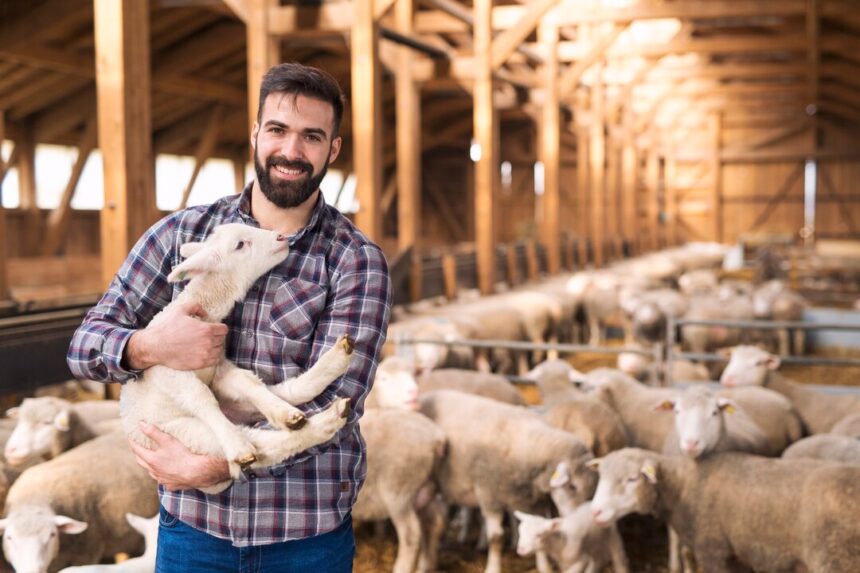Meatmaster sheep, bred specifically for meat production, have gained popularity among farmers in South Africa due to their superior meat quality, adaptability, and low maintenance requirements. Developed through selective breeding for optimal carcass traits and adaptability to harsh environmental conditions, Meatmaster sheep are well-suited to the diverse landscapes and climates of South Africa. Whether you’re considering breeding or farming Meatmaster sheep, understanding key aspects of their management and care is crucial for success. In this article, we’ll explore 10 important things you should know about breeding and farming Meatmaster sheep in South Africa.
- Meatmaster Characteristics:
Meatmaster sheep are a composite breed developed in South Africa by crossing various indigenous and imported breeds, including Damara, Dorper, Van Rooy, and Suffolk. They are renowned for their muscular build, fast growth rates, and efficient feed conversion, making them ideal for meat production. Meatmaster sheep exhibit a variety of coat colors, including white, brown, black, and mixed patterns. - Meat Quality:
As their name suggests, Meatmaster sheep are bred primarily for meat production, with a focus on producing high-quality carcasses. They typically yield well-muscled carcasses with minimal fat, resulting in lean and flavorful meat prized by consumers. The meat from Meatmaster sheep is tender, succulent, and well-marbled, making it suitable for a wide range of culinary applications. - Adaptability:
One of the key advantages of Meatmaster sheep is their adaptability to various environmental conditions. They thrive in both arid and semi-arid regions, making them well-suited to the climatic diversity of South Africa. Meatmaster sheep have excellent heat tolerance and resistance to parasites, making them low-maintenance and cost-effective to raise in extensive grazing systems. - Grazing and Feeding:
Meatmaster sheep are well-suited to grazing-based feeding systems, thriving on a diet of pasture grasses supplemented with mineral supplements and protein-rich forage as needed. They have efficient feed conversion rates, making them economical to feed compared to some other sheep breeds. Proper grazing management and nutrition are essential for maximizing growth rates and reproductive performance in Meatmaster sheep farming operations. - Reproduction and Lambing:
Meatmaster ewes are known for their fertility and ease of lambing, with most ewes exhibiting strong maternal instincts and good mothering ability. Proper reproductive management, including ram selection, estrus synchronization, and lambing assistance as needed, is essential for maximizing lambing rates and lamb survival. Timely vaccinations and deworming are crucial for ensuring the health and vitality of newborn lambs. - Breeding Objectives:
When breeding Meatmaster sheep in South Africa, farmers typically focus on improving specific traits such as growth rate, carcass quality, maternal instincts, and parasite resistance. Selective breeding programs aim to enhance desirable traits while maintaining genetic diversity and adaptability to local environmental conditions. Ram selection plays a critical role in achieving breeding objectives and improving flock performance over time. - Health and Disease Management:
Maintaining the health and well-being of Meatmaster sheep is paramount for successful sheep farming. This includes regular vaccinations, deworming, parasite control, and preventive measures against common sheep diseases such as foot rot, internal parasites, and respiratory infections. Routine health checks and timely veterinary care are essential for ensuring the longevity and productivity of Meatmaster sheep. - Herd Management and Record Keeping:
Effective herd management and record-keeping practices are essential for monitoring the performance and productivity of Meatmaster sheep. This includes maintaining detailed records of breeding, lambing, growth rates, health treatments, and financial transactions. By analyzing data and trends, sheep farmers can make informed management decisions to optimize flock performance and profitability. - Market Demand:
The demand for high-quality lamb meat is steadily growing in South Africa, driven by consumer preferences for lean, flavorful, and ethically produced meat products. Meatmaster sheep farmers can capitalize on this market demand by producing premium-quality lamb meat that meets consumer expectations for taste, tenderness, and sustainability. Developing relationships with local markets, restaurants, and specialty retailers can create value-added opportunities for Meatmaster lamb products. - Support and Resources:
For farmers interested in breeding and farming Meatmaster sheep in South Africa, there are various resources and support networks available. These include breed associations, agricultural extension services, sheep farming cooperatives, and online forums where farmers can access information, technical assistance, and networking opportunities to support their Meatmaster farming endeavors.
Breeding and farming Meatmaster sheep offer numerous opportunities for sheep farmers in South Africa. With their superior meat quality, adaptability, and low maintenance requirements, Meatmaster sheep are well-suited to the diverse landscapes and climatic conditions of the country. By understanding key aspects of Meatmaster management, including breeding, grazing, health care, and market demand, sheep farmers can capitalize on the breed’s potential and contribute to the growth and sustainability of South Africa’s sheep farming industry.
Join 'Farmers Mag' WhatsApp Channel
Get the latest Farming news and tips delivered straight to your WhatsApp
CLICK HERE TO JOIN






